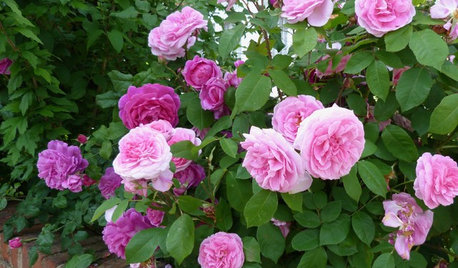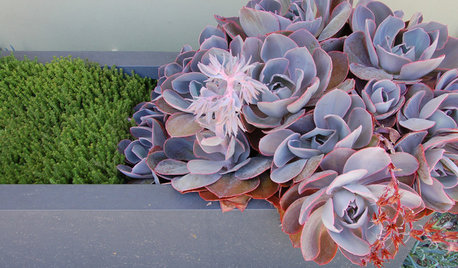Chalk one up for growing organic
alan haigh
11 years ago
Related Stories

FURNITUREThe Coffee Table Grows Up
These statement pieces reinvent the coffee table and can transform the living room
Full Story
REMODELING GUIDESRoom of the Day: Antiques Help a Dining Room Grow Up
Artfully distressed pieces and elegant colors take a formerly child-focused space into sophisticated territory
Full Story
Chalk It Up
It's hard to resist the lure of a blank slate. Add chalkboard paint to any part of your home and watch imagination take hold
Full Story
DECORATING GUIDESTeens' Rooms: The Haven Grows Up
Touches of Sophistication Mix With Fun in Your Teen's Dream Bedroom
Full Story
HOUZZ TOURSMy Houzz: A Home Grows With the Family
A family of four marries French country style with vintage touches in The Hague
Full Story
CRAFTSMAN DESIGNHouzz Tour: A Craftsman Cottage Expands for a Growing Family
Not wanting to give up a house full of memories, a Texas family chooses to build up and out
Full Story
EDIBLE GARDENSSummer Crops: How to Grow Tomatoes
Plant tomato seedlings in spring for one of the best tastes of summer, fresh from your backyard
Full Story
GARDENING GUIDESWhat Kind of Roses Should You Grow?
Want to add the beauty of roses to your garden? Find out which ones, from old-fashioned to modern, are right for you
Full Story
SUCCULENTSGrow a Garden of Succulents for Easy Beauty
Low-water plants in a wide range of colors, shapes and sizes? Sign us up — and check out our faves here
Full Story
EDIBLE GARDENSSummer Crops: How to Grow Watermelons
You might not need as much space as you think to get this summer mainstay to spring up in your garden
Full StoryMore Discussions







Ernie
fusion_power
Related Professionals
Graham Landscape Architects & Landscape Designers · Milwaukee Landscape Architects & Landscape Designers · North New Hyde Park Landscape Architects & Landscape Designers · Wixom Landscape Architects & Landscape Designers · Woodinville Landscape Architects & Landscape Designers · Goodyear Landscape Contractors · Live Oak Landscape Contractors · Lynn Landscape Contractors · Mahwah Landscape Contractors · Mason Landscape Contractors · New Providence Landscape Contractors · Soddy Daisy Landscape Contractors · Kingsburg Landscape Contractors · Golden Valley Landscape Contractors · Norridge Landscape Contractorsolpea
alan haighOriginal Author
canadianplant
olpea
carolync1
JoppaRich
drew51 SE MI Z5b/6a
alan haighOriginal Author
canadianplant
NilaJones
MrClint
skyjs
alan haighOriginal Author
canadianplant
fruitnut Z7 4500ft SW TX
alan haighOriginal Author
olpea
JoppaRich
alan haighOriginal Author
fruitmaven_wiz5
NilaJones
skyjs
yukkuri_kame
alan haighOriginal Author
canadianplant
drew51 SE MI Z5b/6a
olpea
bamboo_rabbit
alan haighOriginal Author
canadianplant
drew51 SE MI Z5b/6a
alan haighOriginal Author
canadianplant
alan haighOriginal Author
NilaJones
alan haighOriginal Author
NilaJones
NilaJones
alan haighOriginal Author
canadianplant
NilaJones
NilaJones
olpea
olpea
alan haighOriginal Author
alan haighOriginal Author
NilaJones
NilaJones